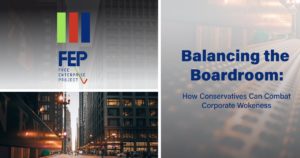
19 May 2021 “This is the Moment in Time” to Stop Marxism in Corporate America
Corporate America’s emergence as a muscle for the left’s radical agenda wasn’t a surprise to everyone.
Bill Walton – a former CEO among many other accomplishments during his career in politics and business – noted on his eponymous talk show that “a lot of us knew this was happening – but now it’s become glaringly obvious to everyone.”
Now that unfortunately “many household names [in corporate America] are now aligned with the political left,” Walton sought answers from his panel about how this happened and what can be done about it. Joining him in the discussion were American Conservative Union Chairman Matt Schlapp and the National Center’s Justin Danhof, Esq.
Justin, who is the director of the National Center’s Free Enterprise Project (FEP), said the National Center’s involvement in this issue stemmed from the organization’s founding values: “[Our] mission is to be a voice where we saw conservatives being the quietest.” And when it came to shareholder activism, he noted that “we saw not a single right-of-center group engaged in it,” while more than a hundred liberal groups were involved.
But the left, in its bravado, has given conservatives who recognize this problem – and are willing to engage on it – a path to victory, because leftists have never really acted in secret regarding their corporate strategy. As Justin noted:
Everything they’ve done is out in the public. All we have to do is reverse-engineer it, and we can have tremendous impact.
The environmental, social and governance (ESG) agenda – which has been embraced by corporations – is “just cover for whatever a liberal policy group is hoping to achieve through big business.” It comes after years of the left getting in the faces of company executives and pressing for its political goals.
To counter that, FEP is copying the left’s model. It has strategically bought stock to have a voice at shareholder meetings and in other interactions with corporations that are straying from their duty of protecting investors. “We needed to promote the other voice in the room,” Justin noted, to stop the left’s march through the business community.
Walton inquired about how many CEOs were on the woke bandwagon, asking: “What percentage does this virus infect?” Justin’s answer shocked him:
Nearly all… Because, if you think about it… These folks are more politicians than they are business people. And who are politicians listening to?… The loudest constituents. The constituents who engage with them…
So that’s why we try to engage with business leaders as often as possible.
Citing FEP’s efforts – and its formidable opposition – Justin said:
For the past decade, we’re the only group – right-of-center – that’s done this consistently… But there’s dozens and dozens of well-capitalized groups on the left that engage in this.
This includes the well-funded pension funds of liberal states and labor unions.
But what about the popular caricature of the conservative CEO?
CEOs may not all be leftists, but they react to influences such as loud groups of investors. “It’s an imbalance of pressure,” Justin explained. “They don’t feel any pain from conservatives.”
In a discussion about how to confront the left and the woke CEOs under its control, Justin discounted boycotts as a threat with no teeth. He said people are ultimately unlikely to give up their favorite sodas or running shoes, and boycotts remove people from any chance of negotiation. Engagement, he said, is key. Investors’ proxy votes on directors and proposals are an important and untapped asset right now because as many as 30% of shareholders don’t vote.
Proposals, Justin warned, are an indicator of where the left plans to guide companies. As an example of this ominous-yet-open threat, he noted that the currently popular concept of corporate boards needing quotas to guarantee board seats for women and for racial and sexual minorities was broached unsuccessfully just a few years ago in proposals offered by radicals such as Jesse Jackson and organized labor. Today, Goldman Sachs is requiring such set-asides for companies before it will help with initial public offerings (IPOs), while NASDAQ is seeking government approval to delist American companies on its trading floor that won’t comply with quotas.
The left, Justin noted, also wields tremendous influence by dominating the market for “proxy advisory services” and telling investors to “support all manner of ESG resolutions.” It often works against a fiduciary responsibility to shareholders, like in the case of a recent resolution for Chevron. The resolution called for the energy-producing company to abide by the regulatory edicts of the Paris climate accord, which “would eventually mothball Chevron and all the investors would go broke.” Yet the proposal was supported by the proxy advisory service Institutional Shareholder Services (ISS) and the asset management firm BlackRock. In the end, 52% of voting shareholders favored something that was not in their interests, in part because of this bad advice.
Copying the tactics of the left, which Justin reminded are not a secret, FEP is producing tools for conservative investors:
We have two guides out there that can make this easier for folks – how to vote their values.
 Those publications are the Investor Value Voter Guide that focuses on proposals, and Balancing the Boardroom about corporate boards of directors.
Those publications are the Investor Value Voter Guide that focuses on proposals, and Balancing the Boardroom about corporate boards of directors.
Further down the chain of command, but wielding incredible influence these days, are the chief diversity officers and human resources (HR) staffs.
“Where did they come from? Where did the idea of chief diversity officers even begin?” Justin asked rhetorically. “These folks all came from academia, and graduated to business.”
 Proposals lead to negotiations, and the left has leveraged this for years to get what it wants from corporations. About the time conservatives began to realize this, the woke transformation had already changed the dynamic. While Justin originally negotiated with investor relations and general counsels’ offices, he now commonly has to also interface with diversity officers – who often seem to edge out the other corporate actors and swing proceedings further leftward. Justin noted that he senses a “fear” of the chief diversity officers among their colleagues, and that they command an “outsized role” – along with HR departments – in ruling today’s corporate environments.
Proposals lead to negotiations, and the left has leveraged this for years to get what it wants from corporations. About the time conservatives began to realize this, the woke transformation had already changed the dynamic. While Justin originally negotiated with investor relations and general counsels’ offices, he now commonly has to also interface with diversity officers – who often seem to edge out the other corporate actors and swing proceedings further leftward. Justin noted that he senses a “fear” of the chief diversity officers among their colleagues, and that they command an “outsized role” – along with HR departments – in ruling today’s corporate environments.
Talking about outside influences, Justin mentioned that the Human Rights Campaign (HRC) is a radical lobby group exerting enormous control over businesses. Companies, Justin asserted, are effectively “funding them to tell them how to act.” HRC’s pro-LGBT demands on businesses are why there are so many LGBT characters in commercials and rainbow logos on company Twitter accounts in June.
And over 400 companies are following the HRC’s lead by supporting the so-called “Equality Act.” Their corporate logos are on prominent display on the HRC website. “The list is growing every day,” Justin warned. That’s extremely concerning, since this bill, should it become law, would “not only crush women’s sports, but women-owned businesses” and religious freedom.
Justin said the time to engage with these companies is now:
We need to hammer these companies… They’re just signing up because the Human Rights Campaign asked them to… Why did they sign up? Part of the answer is that they didn’t think there would ever be pushback. So let’s be the pushback.
At the same time, there is the problem of toxic workplaces dominated by politics. Cancel culture in the business world is not like what you see it the tabloids, Justin explained. It’s much more subtle:
It’s the employee at Coca-Cola who doesn’t want to go to the critical race theory training because it’s offensive to everyone it touches – telling white people they need to change their melanin levels… and telling black people they’re oppressed. It’s so offensive to everyone involved. Cancel culture is that employee who can’t go to HR and say “this is nuts”… They’re self-cancelling.
“If you could go back to the 1960s and stop the cultural Marxist revolution in academia, that is where we are right now with business,” Justin concluded. “This is the moment in time to stop the Marxist march through corporate cultural lanes.”



